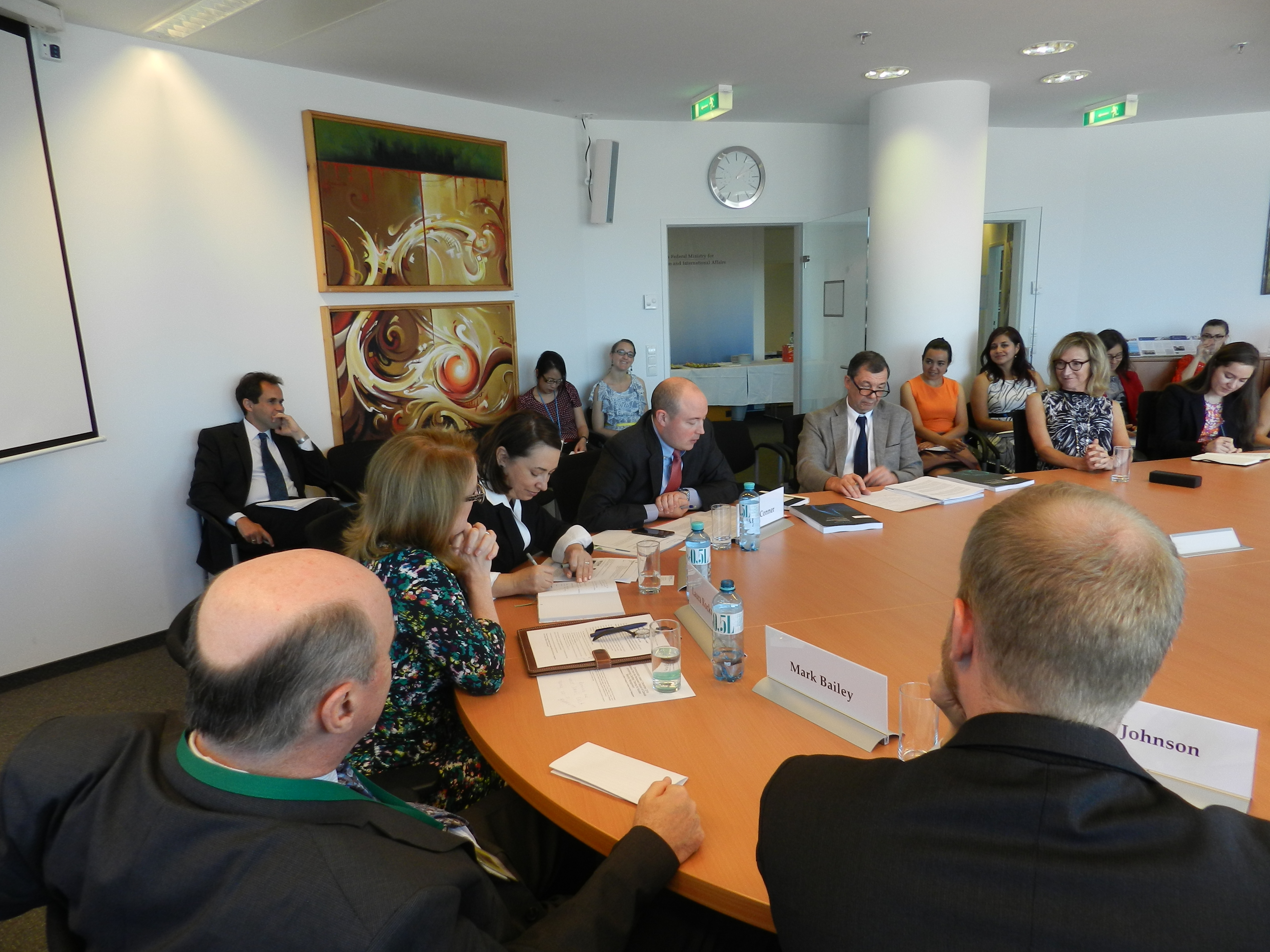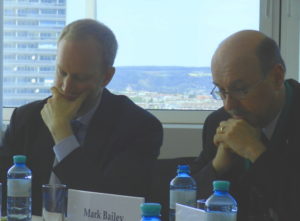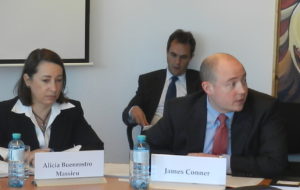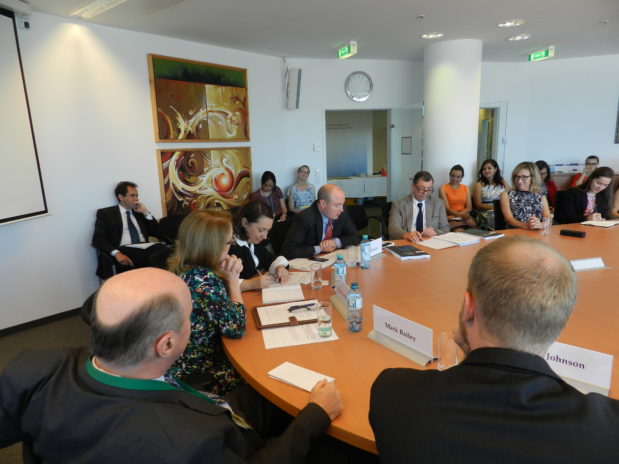
On 9 June 2017, the VCDNP held a seminar in collaboration with the World Institute for Nuclear Security (WINS) entitled “Sustaining Nuclear Security Training and Support Centres: Lessons Learned and the Way Forward.” The four speakers were: Ambassador Alicia Buenrostro Massieu, Permanent Representative of Mexico to the International Organizations in Vienna; Ambassador Mark Bailey, Permanent Representative of Canada to the International Organizations in Vienna; James Conner, Nuclear Security Officer, International Atomic Energy Agency (IAEA); and Dan Johnson, Head of the WINS Academy, WINS. The discussion was moderated by Laura Rockwood, VCDNP Executive Director, and followed by a question and answer period.
Dan Johnson opened the discussion with an overview of the historical background, developments, and current activities of WINS, which has around 4000 members from 122 countries. Mr. Johnson explained that the Institute was involved in a broad range of activities, including but not limited to: organization of workshops, roundtables, and forums to bring together practitioners in the field of nuclear security; publication of guidance documents; and certification in nuclear security management. Among WINS’ achievements is the WINS Academy Certification Programme for Nuclear Security (which can be completed entirely online) that was launched in 2014 and has 900 professionals currently enrolled. Johnson underlined Canada’s role in the preparation of the Joint Statement on Certified Training for Nuclear Security Management, presented at the 2016 Nuclear Security Summit and circulated as IAEA INFCIRC/901 at the beginning of 2017. The Statement has been endorsed by 12 other countries as well. He also talked about the successful collaboration between WINS, Canada and Mexico to support the Mexican Nuclear Security Training and Support Centre (NSSC) to develop national and regional in-person training on radioactive source security. He noted that this was an example of a best practice in bilateral cooperation in the area of nuclear security. Drawing on the experience of the Mexican collaboration, WINS has produced an ISO 29990 Implementation Handbook, which provides a detailed explanation of the processes and prerequisites for the establishment of an ISO 29990 certified NSSC (including WINS’ lessons learned). The emphasis is on the achievement of a certified NSSC that is effective and sustainable, and able to provide high quality programmes that support the implementation of international recommendations, national regulations and international best practices.

Ambassador Bailey also discussed the joint project with WINS and Mexico. He emphasized that Canada has been and remains a strong advocate for nuclear security around the world, and has contributed to the maintenance of nuclear security through regional cooperation, capacity building workshops and the establishment of the WINS Academy. Ambassador Bailey confirmed Canada’s intention to continue close cooperation with WINS, noting the value Canada places on the NSSCs as a means to improving standards of training and education, which is viewed as vital for the development of sustainable national, regional and global nuclear security.
Ambassador Buenrostro Massieu provided an update on the joint project with WINS and Canada to develop a programme for nuclear security training and certification at Mexico’s Nuclear Security Training and Support Centre, to benefit the Latin American and Caribbean region, whose first national training course had taken place in May 2017. She identified four key areas of focus for Mexico: nuclear forensics; detection; architecture; and nuclear security culture. The Ambassador emphasized the importance of training and sustainability of human resources. She emphasized that an individual country could not face the problems associated with nuclear security if it did not have its own capacity and capabilities to assess challenges and counter threats. She noted Mexico’s active role in the International Network for Nuclear Security Training and Support Centres (NSSC network) and her country’s readiness to share lessons learned, expressing her hope for more involvement of the countries of Central America in nuclear security related activities.

Mr. Conner provided an overview of the history of the NSSC concept, and the activities and achievements of the NSSC network, as well as actions States could take to maintain the sustainability of the NSSCs in the long term. Since 2012, the number of States participating in the NSSC network has increased from 16 to 58. While the broad diversity of membership offered a great opportunity to share experiences, it also posed challenges in identifying good practices and commonalities among the Centres. Mr. Conner offered examples of cooperation between States, such as through enhancing information-sharing tools and improving information management. Noting that while NSSCs are seen as a key tool for addressing nuclear security, Mr. Conner stated that their establishment might not be necessary in every State to achieve effective national nuclear security. He emphasized the importance of starting with a systematic approach to assessing a State’s nuclear security needs for training, technical, and scientific support before embarking on an NSSC. According to Mr. Conner, one of the biggest challenges for States in sustaining NSSCs is effective coordination among all national stakeholders.
The seminar was followed by a lively discussion in which the well-informed audience engaged with the speakers and shared their concerns and ideas. The lack of engagement with industry was identified by some participants as a significant gap that could and should be addressed. Another issue that was discussed was how to prioritize who gets trained in the field. During the discussion, Ambassador Buenrostro Massieu noted that, for Mexico, it should be relatively easy to identify various stakeholders—from nuclear engineers to intelligence and border-control services—who should be involved and trained in this area. It was also highlighted that, whereas most nuclear facilities had established security programmes, there was a need to ensure that nuclear security workers responsible for detecting and responding to nuclear and other radioactive material out of regulatory control are also highly-qualified and well-trained. Another main topic of discussion related to the steps States could take after establishing a NSSC. Emphasis was placed on the benefits of the NSSC Network, highlighting that States should take advantage of the existing network to enhance regional and even cross-regional cooperation and share expertise. Financial difficulties, which a lot of states face in maintaining nuclear security infrastructure and training, were mentioned by one of the participants. In response to this, Mr. Conner explained that although States can receive support from the IAEA through official requests, they should first assess their needs and identify any gaps in resources required to address those needs. Some participants recommended that States could look at all relevant options when looking for financial support, noting that other States could assist with financing infrastructure on a bilateral basis.
